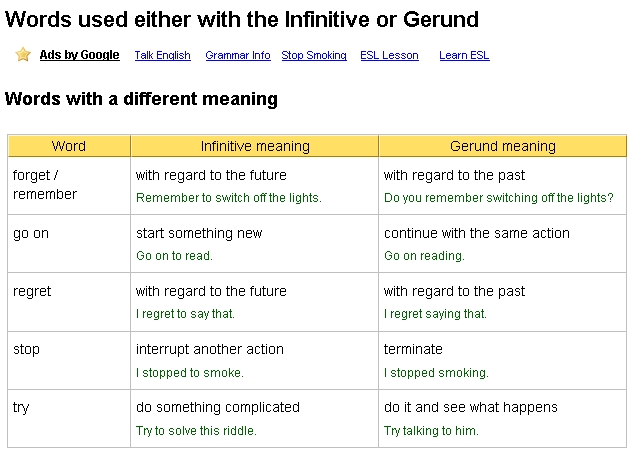|

swissprof

|
Verb pattern
|
|
Hi everybody !
Can you tell me the answer for these two sentences ?
I can �t see clearly the difference !
Thanks a lot
1.How could I forget watching that show ?
2. How could I forget to watch that show ?
the possible answers are :
a ) I just didn �t notice the time
b) It was the best show I �ve never seen !
Thanks for your precious explanations ! may be there is a mistake in the exercise???
swissprof |
14 Nov 2009
|
|
|
|

ARaquelSP

|
As to me, I think that if you ask "How could I forget watching that show?", it means that the show has already been broadcast and you forgot watching it. On the other hand, if you ask "How could I forget to watch that show?", it means you could never forget to watch it because it �s important, so you are still going to watch it. One of the things I explain to my students when I �m introducing the difference between Gerunds and Infinitives is that the Gerunds somehow imply that the event has already happened (I remember posting that letter yesterday. - I posted it) and the Infinitives to imply the event is still going to happen (Please, remember to post that letter.). I don �t know if this is the best explanation, but they seem to understand.
Hope I could be helpful. 
|
14 Nov 2009
|
|
|

swissprof

|
|
Thanks for your help !
but my problem is with the two answers as they both refer to the past so I don �t know what to choose ! |
14 Nov 2009
|
|
|

ARaquelSP

|
|
a) is the asnwer to nr 2 As to the other, you might have to change b) to something like: "I can �t miss this show".
|
14 Nov 2009
|
|
|

libertybelle

|
The first one sounds like something from a book.
No one says that.
If you had planned to see and show and forgot about it - you �d say:
How could I forget to see that show?
and the answer would be:
I just didn �t notice the time.
(or I had too much to do, or I �m getting forgetful these days or what ever!)
|
14 Nov 2009
|
|
|

baiba

|
1 - b, 2 - a, for sure!
I agree with ARaquelSP that in these examples gerund would mean an activity that has already happened, but the infinitive - an action that you still have to do (have not done yet).
|
14 Nov 2009
|
|
|

baiba

|
|
I will not
forget
to
meet him.
(I
will be sure to meet him in the future.)
I will never
forget
meeting them.
(I will not lose the memory of meeting
them.)
|
14 Nov 2009
|
|
|

swissprof

|
|
Thank you Libertybelle
It was my impression and I had these two examples in a worksheet I found about gerunds and infinitives.
I know the basic differences between gerunds and infinitives but these two sentences were so weird for me ! so I won �t keep them !
thanks ! |
14 Nov 2009
|
|
|

baiba

|
These sentences are not weird at all! They are perfectly coherent!
Look at the rules.

|
14 Nov 2009
|
|
|

swissprof

|
|
You are right with your grammar Baiba but if Libertybelle who is a native speaker says nobody would say the first sentence , I don �t want to use it with my students as I prefer natural English ! |
14 Nov 2009
|
|
|

doireband

|
Hi!
There �s an easy way to help explain this, the order in which the things happened.
How could I forget(2) watching that show(1) ?
First you watched the show, then you forgot
How could I forget(1) to watch(2) that show ?
First you forgot, then you didn �t watch the show.
OK this example is a bit confusing because in the end you didn �t watch the show but try it with other examples.
I stopped(1) to smoke(2)
First I stopped and then I smoked
I stopped(2) smoking(1)
First I used to smoke, then I stopped
I remembered(1) to buy(2) the milk
First I remembered then I bought
I remembered(2) buying(1) the milk
First I bought and then I remembered.
|
14 Nov 2009
|
|